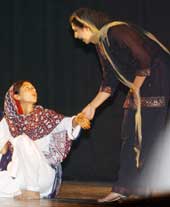 |
| A scene from Pakistani play Bhatti Ki Kahani |
The ?Theatre of the Oppressed?, a term coined by Brazilian practitioner Augusto Boal 30 years ago, has come of age in India through the efforts of Jana Sanskriti in Badu, north of Calcutta. Its successful founding of branches across India enabled it to organise a large-scale festival for the first time. The open-air gathering (Lalan Mancha, November 17-21) showcased the work of all these units as well as that of their fellows in Pakistan, the Interactive Resource Centre, and several folk performances from different parts of Bengal.
?Forum theatre? forms the staple of Jana Sanskriti?s activities, in which the actors present a short play on a problem affecting the audience, then encourage the onlookers to offer solutions by replacing one or more actors and enacting their own response. Thus they become spectactors (Boal?s word). The teams dealt with occupation of tribal land (Maharashtra), insurgency (Tripura), women and politicians (Delhi), alcoholism and witchhunts (Orissa), the nexus between union leaders and political parties, and governmental manipulation of intellectuals and goons (Bengal).
The Gujarat unit proved most instructive in asserting that communalism still reins th-ere, despite the change of power. In another scenario, Ram ke Nam, it depicted Ram asking Hanuman why his Hindutva stormtroopers disobey him, preaching violence in his name. In each case, spectators joined interactively by standing up and performing ways to resolve the situation.
The group from Lahore, welcomed like long-lost friends, displayed high standards of acting, especially among its female members. They were able to debate at length the improvised interventions by Indian participants. Led by Mohammad Waseem, it dramatised the Indo-Pak impasse as one created by the leaders on both sides at the cost of the people?s welfare. Its forum production, Bhatti Ki Kahani, treated with the oppression of brick-kiln employees.
Forum theatre has one drawback, the potentially reductive or unwanted polemical nature of an exchange, caused by the unpredictability of the external contributions. While Jana Sanskriti does a great job in spreading empowerment, it needs to diversify more, adding other methods also conceptualised by Boal. Suggested applications include ?invisible theatre?, in politically dangerous circumstances, and ?legislative theatre?, to develop citizens? rights.










